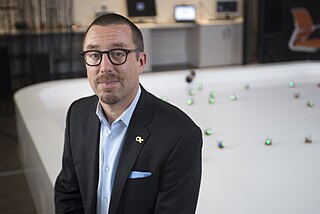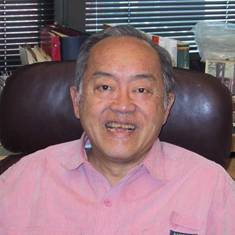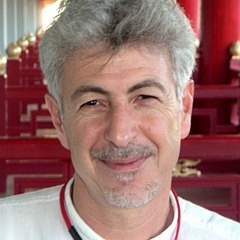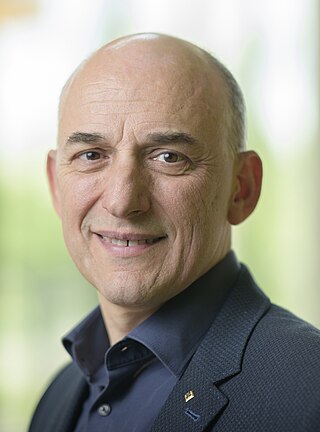
Swarm robotics is an approach to the coordination of multiple robots as a system which consist of large numbers of mostly simple physical robots. ″In a robot swarm, the collective behavior of the robots results from local interactions between the robots and between the robots and the environment in which they act.″ It is supposed that a desired collective behavior emerges from the interactions between the robots and interactions of robots with the environment. This approach emerged on the field of artificial swarm intelligence, as well as the biological studies of insects, ants and other fields in nature, where swarm behaviour occurs.
Thomas B. Sheridan is American professor of mechanical engineering and Applied Psychology Emeritus at the Massachusetts Institute of Technology. He is a pioneer of robotics and remote control technology.
Shigeo Hirose is a pioneer of robotics technology and a professor at the Tokyo Institute of Technology.
Raj Kumar Goel Institute of Technology (RKGIT), is a private college in Ghaziabad, India. It is affiliated to Dr. A.P.J. Abdul Kalam Technical University.

Magnus B. Egerstedt is a Swedish-American roboticist who is the Dean of the Henry Samueli School of Engineering at the University of California, Irvine. He was formerly the Steve C. Chaddick School Chair and Professor at the School of Electrical and Computer Engineering, Georgia Institute of Technology.

Yu-Chi "Larry" Ho is a Chinese-American mathematician, control theorist, and a professor at the School of Engineering and Applied Sciences, Harvard University.
Johann Borenstein is an Israeli roboticist and Professor at the University of Michigan. Borenstein is well known for his work in autonomous obstacle avoidance, and is credited with the development of the Vector Field Histogram.
The IEEE Robotics and Automation Award is a Technical Field Award of the Institute of Electrical and Electronics Engineers (IEEE) that was established by the IEEE Board of Directors in 2002. This award is presented for contributions in the field of robotics and automation.
Masakatsu G. Fujie is a Japanese scientist who has played a major role in cutting-edge research in biomedical engineering. He has been responsible for many advances in the field of robotics.
The Dick Volz Best US PhD Thesis in Robotics and Automation is a yearly award to recognize outstanding Ph.D. thesis in the field of robotics and automation at any research institution in the United States of America. It is awarded with a four years delay as it is based both on thesis quality as well as post-graduation impact, hence, the 2007 Dick Volz Best US PhD Thesis Award was awarded in 2011. Its European counterpart is the Georges Giralt PhD Award.
Tendon-driven robots (TDR) are robots whose limbs mimic biological musculoskeletal systems. They use plastic straps to mimic muscles and tendons. Such robots are claimed to move in a "more natural" way than traditional robots that use rigid metal or plastic limbs controlled by geared actuators. TDRs can also help understand how biomechanics relates to embodied intelligence and cognition.

Oussama Khatib is a roboticist and a professor of computer science at Stanford University, and a Fellow of the IEEE. He is credited with seminal work in areas ranging from robot motion planning and control, human-friendly robot design, to haptic interaction and human motion synthesis. His work's emphasis has been to develop theories, algorithms, and technologies, that control robot systems by using models of their physical dynamics. These dynamic models are used to derive optimal controllers for complex robots that interact with the environment in real-time.
Bradley James Nelson is an American roboticist and entrepreneur. He has been the Professor of Robotics and Intelligent Systems at ETH Zurich since 2002 and is known for his research in microrobotics, nanorobotics, and medical robotics.

Stefano Stramigioli is a scientist and engineer born in Italy and now living since 1992 in the Netherlands and holding both the Italian and Dutch nationality. He is affiliated with the University of Twente where he leads the Robotics And Mechatronics (RAM) Lab. He is also covering a guest co-chair position at the International Laboratory of BioMechatronics and Energy Efficient Robotics at ITMO, St. Petersburg, Russia.
Karl Henrik Johansson is a Swedish researcher and best known for his pioneering contributions to networked control systems, cyber-physical systems, and hybrid systems. His research has had particular application impact in transportation, automation, and energy networks. He holds a Chaired Professorship in Networked Control at the KTH Royal Institute of Technology in Stockholm, Sweden. He is Director of KTH Digital Futures.

Yoram Koren is an Israeli-American academic. He is the James J. Duderstadt Distinguished University Professor Emeritus of Manufacturing and the Paul G. Goebel Professor Emeritus of Engineering at the University of Michigan, Ann Arbor. Since 2014 he is a distinguished visiting professor at the Technion – Israel Institute of Technology.
Dawn Marie Tilbury is an American control theorist whose research topics include logic control, networked control systems, robotics, human–machine systems, and autonomous vehicles. She is a professor of mechanical engineering and of electrical engineering and computer science at the University of Michigan, and the head of the directorate for engineering at the National Science Foundation.
Sonia Martínez Díaz is a Spanish mechanical engineer whose research applies control theory to the coordinated motion of robot swarms and mobile wireless sensor networks. She is a professor in the Department of Mechanical and Aerospace Engineering at the University of California, San Diego.
A continuum robot is a type of robot that is characterised by infinite degrees of freedom and number of joints. These characteristics allow continuum manipulators to adjust and modify their shape at any point along their length, granting them the possibility to work in confined spaces and complex environments where standard rigid-link robots cannot operate. In particular, we can define a continuum robot as an actuatable structure whose constitutive material forms curves with continuous tangent vectors. This is a fundamental definition that allows to distinguish between continuum robots and snake-arm robots or hyper-redundant manipulators: the presence of rigid links and joints allows them to only approximately perform curves with continuous tangent vectors.

Ali Galip Ulsoy is an academic at the University of Michigan (UM), Ann Arbor, where he is the C.D. Mote, Jr. Distinguished University Professor Emeritus of Mechanical Engineering and the William Clay Ford Professor Emeritus of Manufacturing.






